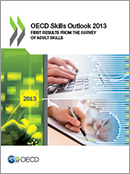Seven findings are specifically relevant for EU education and training policies:
- 20% of the EU working age population has low literacy and low numeracy skills
- Education and skills increase employability
- The high-skilled are progressing well through adult learning, but people with low proficiency are easily caught in a low skills trap as they are less likely to participate in learning activities
- There are significant differences between individuals with similar qualifications across the EU: upper secondary graduates in some Member States score similar or better than higher education graduates in others
- 25% of the adults lack the skills to effectively make use of ICT
- The skills of a person tend to deteriorate over time if they are not used frequently
- Sustaining skills brings significant positive economic and social outcomes
The Survey will contribute to the monitoring of the Europe 2020 strategy and to the implementation of the Education and Training Strategy.
The Commission and OECD will launch a new Education and Skills online Assessment tool later this year. This will allow people to test their skills and benchmark their own abilities in an international context.

| Attachment | Size |
|---|---|
| 7.34 MB |